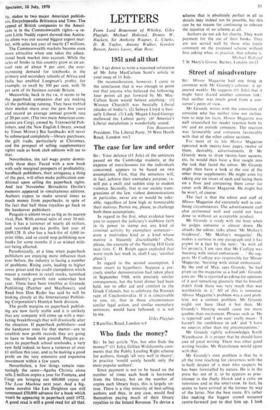The case for law and order
Sir: Your defence (11 July) of the sentences passed on the Cambridge students, at the expense of mercilessness for the individuals concerned, appears to be based on two assumptions. First, that the sentences will, in fact, achieve their exemplary purpose, i.e. will put a swift and sudden stop to student violence. Secondly, that in our society trans- gressions of the law, violent demonstrations in particular, never are or would be toler- able, regardless of how high or honourable their motives. Permit me, please, to challenge both these assumptions.
In regard to the first, what evidence have you to support the judiciary's stubborn faith in its power to stamp out any kind of criminal activity by exemplary sentences— even a motiveless kind or a kind whose motive is blatantly discreditable? (Not, please, the example of the Notting Hill Gate race riots. C. H. Rolph again exploded that worn myth last week in, shall I say, 'another place.') In regard to the second assumption, I must resort to hypothesis. Suppose a pre- cisely similar demonstration had taken place in September 1968, with precisely similar consequences, but the hotel dinner had been held, not to offer aid and comfort to the Greek Colonels, but to celebrate the Russian rape of Czechoslovakia. If it is conceivable to you, sir, that in those circumstances similar legal action, and similar exemplary sentences, would have followed, it is not to me.






















































 Previous page
Previous page